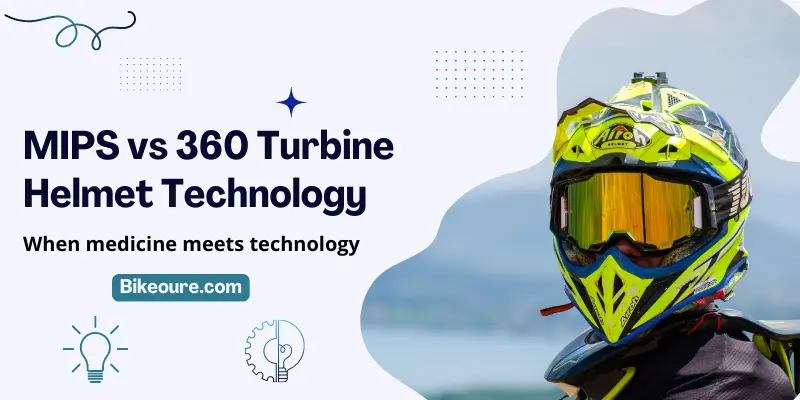Coming across various helmet technologies for protecting your head can get you thinking about which one you should go for and why? So, stay with me and read this MIPS vs 360 turbine helmet technology guide to find out which one provides more safety to the rider.
I will start by explaining MIPS technology first and then move towards 360 turbine helmet technology.
Contents
MIPS vs 360 Turbine Helmet Technology Comparison

What is MIPS Technology?
Multi-directional Impact Protection System or MIPS is a safety technology that more than 120 brands use in their helmets. Most cycling helmets use MIPS technology. On the outside of a MIPS helmet, you will see a yellow liner and a small yellow dot.
History of MIPS Technology
Hans Von Holst who was a Swedish neurosurgeon began to study helmet construction in 1997. Hans partnered with Peter Halldin who was a researcher at the Royal Institute of Technology. Their goal was to contribute to the evolution of helmet technology. Peter, Hans, and 3 other specialists founded the company, MIPS AB in the year 2001. MIPS launched its first helmet in 2007 and it was an equestrian helmet.
MIPS AB has extensive medical and technological expertise focused on head injuries. Apart from this, they conduct studies involving injury prediction in addition to the stimulation of head and neck injuries using advanced data methods. With an experience of more than 30 years, the company has extensive knowledge about injuries of the head and neck regions.
Working of a MIPS Helmet Technology
- MIPS helmet uses a moving layer to stop rotational impacts from passing onto the brain.
- The core of a MIPS helmet imitates the protective structure of your head. A layer of cerebrospinal fluid that is between the skull and brain protects your head from rotational forces produced during impacts. So, MIPS helmets deal with these rotational forces while most helmets only deal with linear forces.
- This is vital because when you fall from a bike, the chance of you falling vertically onto the ground is relatively less. There is always an angle involved when you crash from a bike.
- Now, MIPS has introduced a sliding layer into the helmet which gives a better chance to the head and brain to continue linear direction during the impact, ensuring maximum protection.
Now, let’s talk about 360 turbine helmet technology.
What is 360 Turbine Technology?
This helmet technology is particularly for reducing the risk of head and brain injuries caused by impact. In this type, the turbines include a non-Newtonian (armor gel) which hardens on impact.
Working of a 360 Turbine Helmet Technology
- Placed along the inside of the helmet’s EPS liner, the disc-shaped turbines position directly against the skull when you put your helmet on.
- During a crash, the turbines deform and bend. As a result, it will reduce rotational acceleration and low-velocity linear acceleration and absorb the energy as well.
- The latest 360 turbine technology reduces the head impact at concussion level by up to 30%. Also, it reduces rotational acceleration to the head and brain by about 40%.
Why is Protection against Rotational Force Essential?
The team at MIPS uses two analogies that tell us why the prevention of rotational forces transferring to the brain is essential.
Halldin said that the human brain has similarities with water as it cannot be compressed just like water. So, when you expose a human head or a bowl of water to a linear force, you will observe low deformation figures for the central parts of both the brain and the bowl of water. Also, you will notice higher strain values on the center when you introduce a rotational force.
Moreover, the head of product development at MIPS, Marcus Seyffarth uses the analogy of the stretching of a rubber band to describe the effect these strain values can have. Just like stretching an elastic band more will make it less likely to return to its original shape, the same is the case with rotational forces in the brain.
This clearly shows that having a little bit of rotational motion in the brain is of no harm. But, if it is a little more, a little bit of concussion may occur but you’ll be fine. However, getting more than this can give you a severe traumatic brain injury.
Now, such a severe traumatic brain injury can manifest in various ways. It can lead to DAI (Diffuse Axonal Injury) in which the axons or nerve fibers shear in your brain. Besides, a subdural hematoma can occur due to the tearing of veins, resulting in the collection of blood between the skull and brain. This further leads to symptoms like feeling sick to paralysis on one side of the body.
What Effect does MIPS have on the Helmet Size?
During the start of the MIPS, they would retrofit their technology into helmets already made. So, this would affect the size of the helmet as MIPS would add a 0.5-0.8 mm layer. As a result, it would reduce the available headspace. But, now this rarely happens ever since MIPS have started working with brands from the manufacturing stage of their helmets. So, helmets now provide more space and remain true to size.
This was all for MIPS vs 360 turbine helmet technology. Keep reading to find out some more questions answered about MIPS helmets.
If you’re new to mountain biking then you may also want to know why MTB helmets have visor
Frequently Asked Questions
Are MIPS helmets really better?
MIPS helmets are really better in the sense that they are at least 10% better at handling rotational forces as compared to helmets without MIPS.
Is a MIPS motorcycle helmet worth it?
Although a MIPS motorcycle helmet can cost you a little extra, it is worth it due to the safety it provides compared to other helmet safety technologies.
What is MIPS technology helmet?
MIPS refers to the Multi-directional Impact Protection System. It is a slip-plane technology present inside a helmet. The purpose of MIPS technology is to reduce rotational forces caused by certain impacts.
What is special about a MIPS helmet?
Having a helmet with MIPS technology reduces rotational force. This reduces the chance of concussion and other brain injuries and thus saves you from major impact during accidents.
Concluding 360 Turbine vs MIPS Helmet Technology Comparison
Traditional helmets would prevent heavy impact by absorbing energy during a crash. But, they could not do anything about rotational forces which would result in serious damage during an accident. Whereas these new helmet technologies guarantee the safety of every biker by working to reduce rotational forces.
To sum up, after knowing about both types, it’s up to you now to decide which type would assist you best in your cycling.

Hi, This is Catharine Pendrel, a professional cyclist and founder of Bikeoure. I have been riding bikes for more than 23 years and writing about cycling and other outdoor magazines for about 5 years. Mountain biking has been my passion ever since I first came across it a decade ago. I participated in various MTB tournaments and won numerous mountain trail races.
I started Bikeoure to share my expertise and cycling experience with cyclists all around the world to make them addicted to cycling. My cycling and solo traveling expertise help new cyclists find the best and latest gear in the market for their cycling adventures.